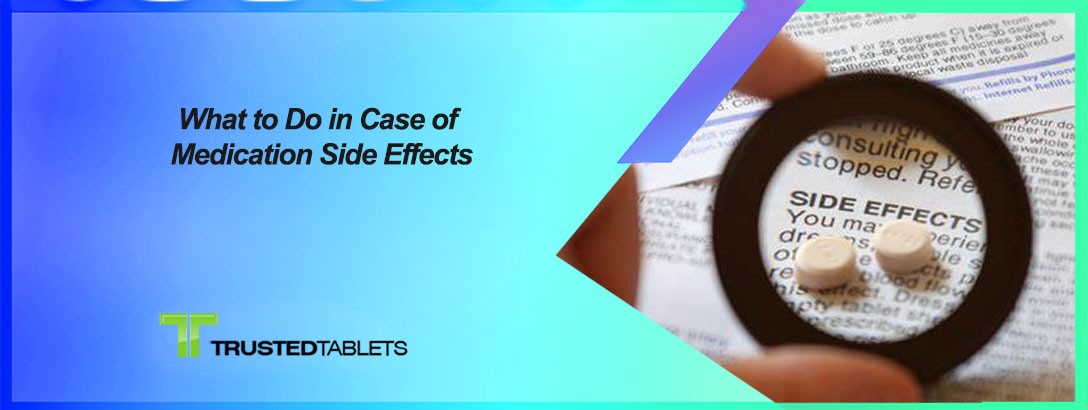Understanding Medication Side Effects
When you start a new medication, experiencing side effects can be concerning. Here’s a comprehensive guide on what to do if you encounter medication side effects.
What Are Medication Side Effects?
Medication side effects are undesirable effects that occur alongside the intended effects of a medication. These can range from mild to severe and vary depending on the medication and individual factors. Side effects can affect different parts of the body and manifest in various ways.
Why Do Side Effects Occur?
Understanding why side effects occur can help you deal with them better. Side effects usually happen because medications may affect not only the target issue but also other parts of the body. They can also result from individual differences in metabolism or interactions with other medications.
How Common Are Side Effects?
The frequency and severity of side effects vary widely among different medications and individuals. Some people may experience minimal side effects, while others may experience them more severely. It’s essential to know that not everyone will experience side effects from a particular medication.
Recognizing Common Side Effects
Common side effects vary depending on the medication but can include nausea, dizziness, headaches, drowsiness, or gastrointestinal issues. Understanding common side effects can help you recognize them early on.
When to Contact Your Healthcare Provider
If you experience side effects, it’s crucial to know when to contact your healthcare provider. Severe side effects like difficulty breathing, chest pain, severe allergic reactions, or unusual symptoms should be addressed immediately. Additionally, persistent or bothersome side effects should also prompt a call to your doctor.
Tips for Managing Side Effects at Home
There are several ways to manage mild to moderate side effects at home. These may include adjusting the time you take your medication, taking it with food, staying hydrated, or using over-the-counter remedies for symptoms like nausea or headaches.
Importance of Not Stopping Medication Abruptly
Even if you experience side effects, it’s vital not to stop your medication abruptly without consulting your doctor. Suddenly discontinuing medication can lead to adverse effects, worsening of the condition, or withdrawal symptoms.
Communicating With Your Healthcare Provider
Open communication with your healthcare provider is key. Be sure to report any side effects you experience, even if they seem minor. Your doctor can provide guidance on managing them or adjust your treatment plan if necessary.
Seeking Emergency Help
In case of severe side effects or allergic reactions, don’t hesitate to seek emergency medical help. If you’re unsure whether your symptoms warrant emergency care, it’s better to err on the side of caution and seek help.
Educating Yourself About Your Medication
Lastly, educate yourself about your medication. Understand its potential side effects, how to take it correctly, and what to do if side effects occur. Being informed empowers you to manage your health effectively.
FAQ
1. How common are medication side effects?
Medication side effects can vary widely in frequency and severity depending on the medication and individual factors. While some people may experience minimal side effects, others may experience them more severely.
2. When should I contact my healthcare provider about side effects?
You should contact your healthcare provider if you experience severe or persistent side effects, or if you’re unsure about the symptoms you’re experiencing. It’s essential not to ignore any significant changes after starting a new medication.
3. What should I do if I experience severe side effects?
If you experience severe side effects such as difficulty breathing, chest pain, or severe allergic reactions, seek emergency medical help immediately. Don’t hesitate to call emergency services.
4. Can I manage mild side effects at home?
Yes, mild side effects can often be managed at home. Simple measures like adjusting the time you take your medication, staying hydrated, or using over-the-counter remedies can help alleviate mild symptoms.
5. Is it safe to stop medication if I experience side effects?
Abruptly stopping medication can be risky and may lead to adverse effects or worsening of your condition. Always consult your healthcare provider before making any changes to your medication regimen.
6. How can I communicate better with my doctor about side effects?
Be open and honest with your doctor about any side effects you’re experiencing, even if they seem minor. Providing detailed information will help your doctor assess and manage your symptoms effectively.
7. Are there any lifestyle changes that can help minimize medication side effects?
Yes, certain lifestyle changes like maintaining a healthy diet, regular exercise, and getting enough rest can help minimize medication side effects. Discuss with your healthcare provider for personalized advice.


